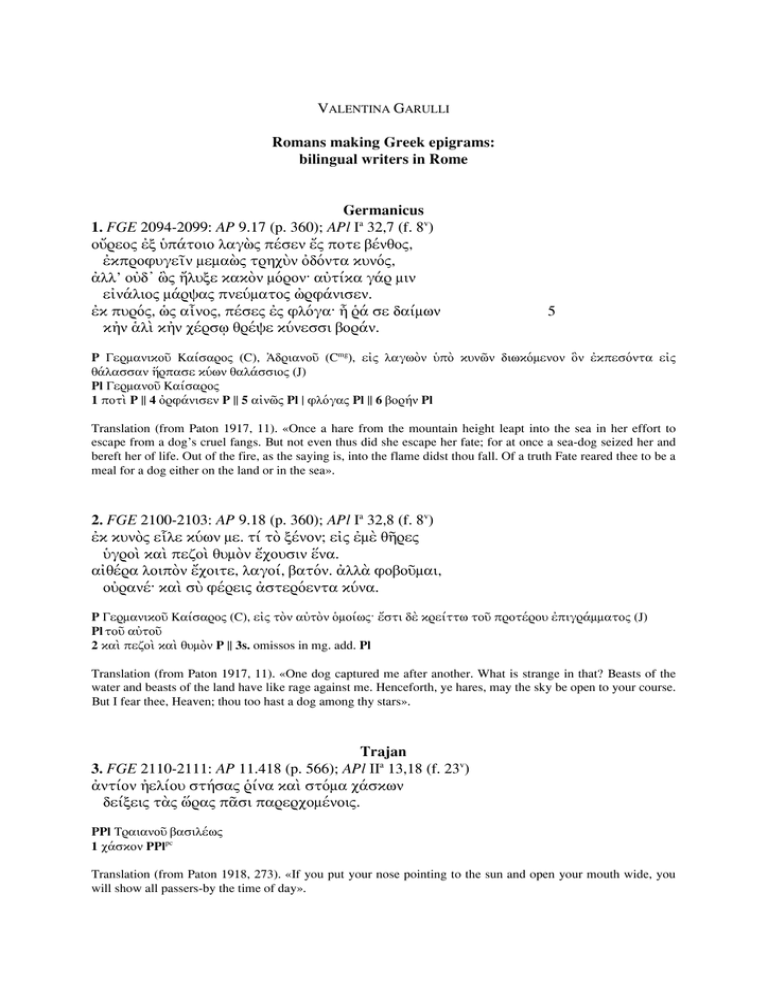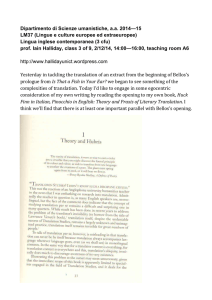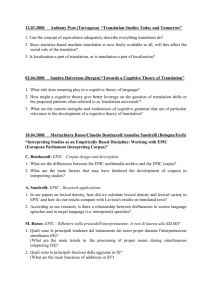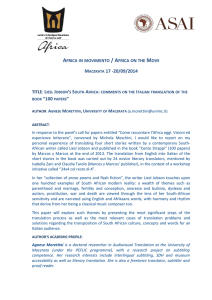V G 32,7 (f. 8
advertisement

VALENTINA GARULLI Romans making Greek epigrams: bilingual writers in Rome Germanicus 1. FGE 2094-2099: AP 9.17 (p. 360); APl Ia 32,7 (f. 8v) ο–ρεος ἐξ ÕπÌτοιο λαγὼς πÔσεν ἔς ποτε βÔνθος, ἐκπροφυγεῖν μεμαὼς τρηχˆν ¿δıντα κυνıς, ἀλλí οÃδ᾽ flς ἤλυξε κακÙν μıρον· αÃτÛκα γÌρ μιν ε∞νÌλιος μÌρψας πνε˜ματος ‹ρφÌνισεν. ἐκ πυρıς, ›ς α∂νος, πÔσες ἐς φλıγα· ἦ ῥÌ σε δαÛμων κ†ν ἁλÚ κ†ν χÔρσῳ θρÔψε κ˜νεσσι βορÌν. 5 P Γερμανικοῦ ΚαÛσαρος (C), Ἀδριανοῦ (Cmg), ε∞ς λαγωÙν ÕπÙ κυνῶν διωκıμενον √ν ἐκπεσıντα ε∞ς θÌλασσαν •ρπασε κ˜ων θαλÌσσιος (J) Pl Γερμανοῦ ΚαÛσαρος 1 ποτÚ P || 4 ¿ρφÌνισεν P || 5 α∞νῶς Pl | φλıγας Pl || 6 βορήν Pl Translation (from Paton 1917, 11). «Once a hare from the mountain height leapt into the sea in her effort to escape from a dogís cruel fangs. But not even thus did she escape her fate; for at once a sea-dog seized her and bereft her of life. Out of the fire, as the saying is, into the flame didst thou fall. Of a truth Fate reared thee to be a meal for a dog either on the land or in the sea». 2. FGE 2100-2103: AP 9.18 (p. 360); APl Ia 32,8 (f. 8v) ἐκ κυνÙς ε∑λε κ˜ων με. τÛ τÙ ξÔνον; ε∞ς ἐμÓ θῆρες ÕγροÚ καÚ πεζοÚ θυμÙν ἔχουσιν ἕνα. α∞θÔρα λοιπÙν ἔχοιτε, λαγοÛ, βατıν. ἀλλÏ φοβοῦμαι, οÃρανÔ· καÚ σˆ φÔρεις ἀστερıεντα κ˜να. P Γερμανικοῦ ΚαÛσαρος (C), ε∞ς τÙν αÃτÙν ¡μοÛως· ἔστι δÓ κρεÛττω τοῦ προτÔρου ἐπιγρÌμματος (J) Pl τοῦ αÃτοῦ 2 καÚ πεζοÚ καÚ θυμÙν P || 3s. omissos in mg. add. Pl Translation (from Paton 1917, 11). «One dog captured me after another. What is strange in that? Beasts of the water and beasts of the land have like rage against me. Henceforth, ye hares, may the sky be open to your course. But I fear thee, Heaven; thou too hast a dog among thy stars». Trajan 3. FGE 2110-2111: AP 11.418 (p. 566); APl IIa 13,18 (f. 23v) ἀντÛον †ελÛου στήσας ῥÛνα καÚ στıμα χÌσκων δεÛξεις τÏς ·ρας πᾶσι παρερχομÔνοις. PPl Τραιανοῦ βασιλÔως 1 χÌσκον PPlpc Translation (from Paton 1918, 273). «If you put your nose pointing to the sun and open your mouth wide, you will show all passers-by the time of day». 2 valentina.garulli@unibo.it Hadrian 4. FGE 2112-2121: AP 6.332 (p. 203); Suda κ 454 (1-3 ἄνθετο), λ 609 (3 δοιÏ-4), ο 955 (3 καÚ-4), ε 1586 (5-6, om. „ι ÕπÙ δ.), κ 2391 A. (7-8) ΖηνÚ τıδí Α∞νεÌδης ΚασÛῳ ΤραϊανÙς ἄγαλμα, κοÛρανος ἀνθρ˘πων κοιρÌνῳ ἀθανÌτων, ἄνθετο, δοιÏ δÔπα πολυδαÛδαλα καÚ βοÙς ο–ρου ἀσκητÙν χρυσῷ παμφανıωντι κÔρας, ἔξαιτα προτÔρης ἀπÙ ληÛδος, ἦμος ἀτειρής 5 πÔρσεν Õπερθ˜μους ᾧ ÕπÙ δουρÚ ΓÔτας. ἀλλÏ σ˜ οἱ καÚ τήνδε, κελαινεφÔς, ἐγγυÌλιξον κρῆναι ἐυκλειῶς δῆριν ἈχαιμενÛην, ƒφρα τοι ε∞σορıωντι διÌνδιχα θυμÙν ∞αÛνῃ 10 δοιÌ, τÏ μÓν ΓετÔων σκῦλα, τÏ δí ἈρσακιδÔων. P Ἀδριανοῦ ἐν τοῖς ἀναθήμασι (A),Τραιανοῦ ΚαÛσαρος (C) Suda κ 454 A. καÚ ἐπιγρÌμματα ἐν τοῖς ἀναθήμασιν çδριανῷ πεποιημÔνα· κτλ. 1 τÌδí Suda || 3 δÔπα Jacobs : λÛτα P : λῖτα Suda λ 609 A. | ο–ρου Salmasius : -ρον P(C), Suda λ 609 A. : -ρων Pac || 4 ἀσκητÙν P(C) : ἀσκητῶν Pac || 5 ἀτειρής Pac : ἀτειρεῖς P(C), Suda || 6 πÔρσας Sud. codd. pars | ᾧ ÕπÙ δουρÚ om. Suda || 7 σ˜ οἱ καÚ om. Suda | κελαινεφÔς PPl : αÃτῷ Suda || 9 ∞αÛνῃ Salmasius : ∞αÛνει P Translation (from Paton 1916, 475f.). «To Casian Zeus did Trajan, the descendant of Aeneas, dedicate these ornaments, the king of men to the king of gods: two curiously fashioned cups and the horn of a urus mounted in shining gold, selected from his first booty when, tirelessly fighting, he had overthrown with his spear the insolent Getae. But, Lord of the black clouds, entrust to him, too, the glorious accomplishment of this Persian war, that thy heartís joy may be doubled as thou lookest on the spoils of both foes, the Getae and the Arsacidae». 5. FGE 2122-2123: AP 7.674 (p. 313); APl IIIb 22,4 (f. 95r) Ἀρχιλıχου τıδε σῆμα, τÙν ἐς λυσσῶντας ∞Ìμβους ἤγαγε ΜαιονÛδῃ Μοῦσα χαριζομÔνη. P Ἀδριανοῦ (C), ε∞ς ἈρχÛλοχον τÙν (J) ΠÌριον (C) ποιητὴν τῶν ∞Ìμβων (J) Translation (from Paton 1917, 359). «This is the tomb of Archilochus, whom the Muse, out of kindness to Homer, guided to the furious iambics». 6. FGE 2124-2127: AP 9.137 (p. 378); APl Ia 4,5 (f. 2v); H 10; David Proll. 11 (CAG XVIII/2 33,1-2.4-5 Busse) a. •μισ˜ μου τÔθνηκε, τÙ δí •μισυ λιμÙς ἐλÔγχει· σῶσıν μου, βασιλεῦ, μουσικÙν ἡμÛτομον. b. ἀμφοτÔρους ἀδικεῖς, καÚ ΠλουτÔα καÚ ΦαÔθοντα, τÙν μÓν ἔτí ε∞σορıων, τοῦ δí ἀπολειπıμενος. P γραμματικοῦ (C), τινÙς ἡμιξήρου πρÙς ἈδριανÙν τÙν βασιλÔα (J), ἡμÛξηρος α∞τήσας ἈδριÌνῳ τῷ βασιλεῖ τροφήν (Ctxt), πρÙς √ν ¡ βασιλεˆς ἈδριανÙς ἀπεκρÛνατο (J) Pl ε∞ς ἡμÛξηρον α∞τήσαντα Ἀδριανῷ βασιλεῖ τροφήν, ἀπıκρισις τοῦ βασιλÔως H κυνικοῦ David ≈θεν καÛ τις ΚυνικÙς φιλıσοφος ἡμÛξηρος ὢν προσῆλθεν ∏ουλιανῷ τῷ βασιλεῖ λÔγων αÃτῷ ταῦτα· κτλ. 1 λιμÙς ἐλÔγχει PPl H (λοιμÙς Matr. B.N. 4635) : δÔρκεται †˘ς David || 2 σῶσıν μου PPl : οἴκτειρον H David | μουσικÙν PPl : κυνικÙν H David Greek Literary Epigram, UCL, 13 September 2013 3 Translation (from Paton 1917, 71). a. «The half of me is dead, and starvation is subduing the other half. Save, Sire, a musical semitone of me». b. «Thou dost wrong both Pluto and the Sun by looking still on the latter and failing to go to the former». 7. FGE 2128: AP 9.402 (p. 427); APl Ia 52,4 (f. 12r); App. BC 2.86; Dio Cass. (Xiphil. epit.) 69.11 τῷ ναοῖς βρÛθοντι πıση σπÌνις ἔπλετο τ˜μβου. P Ἀδριανοῦ ΚαÛσαρος, ε∞ς τÙν τÌφον ΠομπηÛου ἐν Α∞γ˜πτῳ (J) Pl Ἀδριανοῦ βασιλÔως ε∞ς τÌφον ΠομπηÛου App. (scil. τοῦ ΠομπηÛου) τÙ δÓ λοιπÙν σῶμÌ τις ἔθαψεν ἐπÚ τῆς †ϊıνος καÚ τÌφον ἤγειρεν εÃτελῆ· καÚ ἐπÛγραμμα ἄλλος ἐπÔγραψε· κτλ. χρıνῳ δÓ τÙν τÌφον τıνδε ἐπικρυφθÔντα ≈λον ÕπÙ ψÌμμου καÚ ε∞κıνας, ≈σας ἀπÙ χαλκοῦ τῷ ΠομπηÛῳ περÚ τÙ ΚÌσσιον —στερον οἱ προσήκοντες ἀνÔθηκαν, λελωβημÔνα πÌντα καÚ ἐς τÙ ἄδυτıν του ἱεροῦ κατενεχθÔντα ἐζήτησε καÚ ε”ρεν ἐπí ἐμοῦ ῬωμαÛων βασιλεˆς çδριανÙς ἐπιδημῶν, καÚ τÙν τÌφον ἀνεκÌθηρε γν˘ριμον α“θις ε∂ναι καÚ τÏς ε∞κıνας αÃτοῦ ΠομπηÛου διωρθ˘σατο Dio Cass. (scil. ἈδριανÙς) διÏ δÓ τῆς ∏ουδαÛας μετÏ ταῦτα ἐς Αἴγυπτον παριὼν καÚ ἐνήγισε τῷ ΠομπηÛῳ· πρÙς √ν καÚ τουτÚ τÙ ἔπος ἀπορρῖψαι λÔγεται· κτλ. καÚ τÙ μνῆμα αÃτοῦ διεφθαρμÔνον ἀνῳκοδıμησεν Translation (from Paton 1917, 223). «In what sore need of a tomb stood he who possessed abundant temples!». 8. Kaibel, EG 811; IG VII 1828; Hiller, HGE 120; FGE 2129-2136 ‚ παῖ τοξıτα Κ˜πριδος λιγεÛης, Θεσπιαῖς ἙλικωνÛαισι ναÛων ΝαρκÛσσου παρÏ κῆπον ἀνθÔοντα, ἱλήκοις· τÙ δÔ τοι δÛδωσι δÔξο ἀκροθÛνιον ἈδριανÙς ἄρκτου, ἣν αÃτÙς κÌνεν ἱππıθεν τυχήσας. σˆ δí αÃτῷ χÌριν ἀντÚ τοῦ σαıφρων πνÔοις οÃρανÛας ἀπí ἈφροδÛτης. 5 Translation. O archer son of Aphrodite sweetly-singing, you who are dwelling in the Eliconian Thespiae, near the blooming garden of Narcissus, be propitious: accept what Hadrian offers to you, the best part of the bear that he happened to kill from his horse. And you, in return for this, give him temperate inspirations from Aphrodite in her heavenly guise. 9. Kaibel, EG 888a; IEphesos 1539; FGE 2137-2144; SGO 03/02/28; Puech (2002, 128) ΠαντοÛης ἀ[ρετ]ῆ[ς σ]τÌθμην, ῥ[υσÛ]πτολιν ἄνδρα, ἔξοχον Ἑ[λ]λήνων, πρıκριτον ΑÃσονÛων, κλεινοῦ ΚοδρÌτοιο φÛλον πατÔρí, „ι βασίλειον çρμονÛη θÌλαμον πήξατí ἐπí εÃγαμÛηι, ἈδριανÙς Μο˜σαισι μÔλων ἀνÔθηκε Σεουῆρον, 5 ε∞κὼ χαλκεÛην, ο—νεκα προστασÛης. Õ[μῖν δí,] ἄνδρες ºωνες, ἀγÌλματα καλÙν ¡ρᾶσθαι [τοια]ῦτí [ἈρτÔμιδος κτ]ησÛῳ ἐν τεμÔνει. 7 suppl. Kaibel : Õ[μῖν], ἄνδρες Wood || 8 [τοια]ῦτí [ἈρτÔμιδος κτ]ησÛῳ Page : [ἑσταότí Ἀ]ρτÔμ[ιδος πλη]σÛῳ Kaibel, Merkelbach-Stauber : [α∞Óν], ≈τí [ἔστεπται πλη]σÛῳ Wood 4 valentina.garulli@unibo.it Translation (adapted from Wood 1877, 10 no. 7). Hadrianus, a friend of the Muses, dedicated this statue to Severus, a patriot citizen, a model of virtue of every kind, a principal man among the Greeks, and eminent among the Italians, the dear father of the famous Quadratus, for whom wedded love built a royal chamber for a happy married life: a statue of bronze to commemorate his patronage. To you, men of Ionia! It is ever pleasing to see [such] statues in the precinct of Artemis. 10. Kaibel, EG 1089; IG XIV 1089; GVI 2050; FGE p. 569 (b) ἀ]ριδεÛκετον ἀνδρÙς ἀοι[δοῦ τÙν ἈσκανÛη γεÛνατο ΠαρθÔνιο[ν -εσσι τετιμÔνον ἡγεμıνεσσι μυρÌμενον φθιμÔνηι -οισιν ἐπÚ φθιμÔνηι ἐλÔγοισιν ἄμμορον εÃεπÛης τÙ μÓν οἴχετ[ ]τον ÕπÙ πλήμηισιν ἀνα˜ρου γραπτὴν συραμÔνοιο λÛθον -ν δí ἄρí —περθε νÔην α[ ]πÌλι θήκατο τ˜μβο[υ ἈδριανÙς Μουσδí ἐν ¿ψιγıνοισι ἈπαμεÛης 5 10 Translation (from Page 1981, 569). Ö] the conspicuous [tomb] of a poet, whom Ascania [scil. Bithynian Nicaea] bore, Parthenius [Ö] who was honoured by leading men [Ö] who mourned for [his wife Arete] when she died [Ö] when she died, with [Ö] elegies [Ö] not without a full share of eloquence [Ö his tomb] has disappeared under the floods of a torrent, which has dragged away the inscribed stone [Ö] Hadrian has restored a new [inscription] above the tomb [so that his name may be known] among later generations [Ö] Apamea [ Tiberius 11. FGE 2104-2109: AP 9.387 (p. 425); APl Ia 68,4 (f. 16v); I 14; schol. vet. Il. 24.804 (Marc. gr. 822 f. 327r: 5.643 Erbse); schol. Tz. H. 2,86a Leone Ἕκτορ, Ἀρήιον α∑μα, κατÏ χθονÙς εἴ που ἀκο˜εις, χαῖρε καÚ ἄμπνευσον βαιÙν ÕπÓρ πατρÛδος. ºλιον ο∞κεῖται κλεινὴ πıλις ἄνδρας ἔχουσα σοῦ μÓν ἀφαυροτÔρους, ἀλλí ἔτí ἀρηιφÛλους· Μυρμιδıνες δí ἀπıλοντο. παρÛστασο καÚ λÔγí Ἀχιλλεῖ 5 ΘεσσαλÛην κεῖσθαι πᾶσαν Õπí Α∞νεÌδαις. P Ἀδριανοῦ ΚαÛσαρος (A), ε∞ς τÙν Ἕκτορα (J), οἱ δÓ Γερμανικοῦ, Ἡσ˜χιος δÓ ε∞ς ΤιβÔριον τÙν ΚαÛσαρα ἀναφÔρει αÃτı (C) Pl Ἀδριανοῦ ΚαÛσαρος, ε∞ς τÙ αÃτı, οἱ δÓ Γερμανικοῦ I Ἀδριανοῦ ΚαÛσαρος, ε∞ς τÙν Ἕκτορα, ἱστορικοÚ δÓ λÔγουσι ΤιβερÛου ΚαÛσαρος schol. vet. Il. Ἀδριανοῦ ΚαÛσαρος, ε∞ς τÙν Ἕκτορος τÌφον schol. Tz. πολλÏς βίβλους ἈδριανÙς ¡ αÃτοκράτωρ συνεγράψατο „ν τι λέγειν ἐατέον· ῥητέον δÓ διí ἐπῶν αÃτοῦ ε∞ς τÙν Ἕκτορα ἐπιτάφιον· κτλ. 1 ποι schol. vet. Il. | ἀκο˜εις schol. vet. Il. schol. Tz. : ἀκο˜οις PPl || 2 χαῖρε PPl : στῆθι schol. vet. Il. schol. Tz. | ÕπÓρ πατρÛδος βαιÙν P || 4 ἔτι ἀρηιφÛλους schol. Tz. || 5 ΘεσσαλÛη δí οÃκ ἔστι. παρÛστατο κτλ. Pl | Ἀχιλεῖ schol. Tz. || 6 Φαρσαλίη κεῖται χερσÚν schol. Tz. | Α∞νεÌδαις P(C) : Α∞νεÌδας Pac [Translation (from Paton 1917, 217). «Hector of the race of Ares, if thou hearest whereíer thou art under ground, hail! and stay a little thy sighs for thy country. Ilion is inhabited, and is a famous city containing men inferior to Greek Literary Epigram, UCL, 13 September 2013 5 thee, but still lovers of war, while the Myrmidons have perished. Stand by his side and tell Achilles that all Thessaly is subject to the sons of Aeneas».] Horace 12. GPh 3813-3820: AP 7.542 (p. 292); APl IIIa 19,36 (f. 37v) Ἕβρου χειμερÛοις ἀταλÙς κρυμοῖσι δεθÔντος κοῦρος ¿λισθηροῖς ποσσÚν ἔθραυσε πÌγον· τοῦ παρασυρομÔνοιο περιρραγÓς αÃχÔνí ἔκοψεν θηγαλÔον ποταμοῦ ΒιστονÛοιο τρ˜φος. καÚ τÙ μÓν ἡρπÌσθη δÛναις μÔρος, ἡ δÓ τεκοῦσα λειφθÓν —περθε τÌφῳ μοῦνον ἔθηκε κÌρα, μυρομÔνη δÓ τÌλαινα· τÔκος, τÔκος, ε∂πε, τÙ μÔν σου πυρκαϊή, τÙ δÔ σου πικρÙν ἔδαψεν —δωρ. 5 P ΦλÌκκου (C), ε∞ς παιδÛον διερχıμενον τÙν ποταμÙν Ἕβρον κρυσταλλωθÔντα καÚ τοῦ πÌγου περιρραγÔντος ἐξολισθῆσαν διεκıπη τὴν κεφαλὴν ÕπÙ τοῦ παγÔτου καÚ τÔθνηκεν (J) Pl ΦλÌκκου 1 δεθÔντος ex δÓ θÔντος P : πεδηθεÚς Pl || 2 κοῦρος P(C)Pl : -ρας fort. Pac || 3 ἔκοψε Pl || 6 τÌφῳ Reiske : τÌφου PPl || 7 μυρομÔνα P || 8 ἔδαψεν Herwerden : ἔθαψεν PPl [Translation (adapted from Gow-Page 1968, 425). «A stripling boy, his feet slipping, broke through the ice of Hebrus bound by winterís frosts. As he was swept away, a sharp and jagged fragment from the Bistonian river struck through his neck. One part of him was seized by the flood; his head ñ alone left above the surface ñ his mother laid in the grave. Poor woman, she wept and said ëMy child, my child, one part of you the funeral-pyre, the other the cruel waters have consumedí»]. 13. GPh 3843-3844: AP 12.12 (p. 570) ἄρτι γενειÌζων ¡ καλÙς καÚ στερρÙς ἐρασταῖς παιδÙς ἐρᾷ ΛÌδων· σ˜ντομος ἡ ΝÔμεσις. ΦλÌκκου [Translation (from Gow-Page 1968, 427). «Just as his beard begins to grow, Ladon, that beauty so harsh to lovers, is in love with a boy. Nemesis makes short work»]. 14.(?) FGE 167-174: AP 6.165 (p. 169), unde Suda β 140, θ 379, ρ 223, σ 1193 (1); α 1721, 4681 (2); ι 72, κ 2115 (3); θ 613, κ 2279 (4); β 548 (5 καÚ-βρıμον); λ 360 (†δÓ-6) A. στρεπτÙν βασσαρικοῦ ῥıμβον θιÌσοιο μ˜ωπα καÚ σκ˜λος ἀμφιδıρου στικτÙν ἀχαιΐνεω καÚ ΚορυβαντεÛων ∞αχήματα χÌλκεα ῥıπτρων καÚ θ˜ρσου χλοερÙν κωνοφıρου κÌμακα καÚ κο˜φοιο βαρˆν τυμπÌνου βρıμον †δÓ φορηθÔν 5 πολλÌκι μιτροδÔτου λÛκνον —περθε κıμης ΕÃÌνθη ΒÌκχῳ, τὴν ἔντρομον ἁνÛκα θ˜ρσοις ἄτρομον ε∞ς προπıσεις χεῖρα μετημφÛασεν. P ἀνÌθημα τῷ ΒÌκχῳ παρÏ ΕÃÌνθης ΦαλÌκκου (A) 2 σκ˜τος Suda α 1721, 4681 A. || 4 χλοερÙν Suda : -ρῶν P | κωνοφıρον Suda || 6 λÛκνον P(C) : λεῖκνον Pac, Suda λ 360 A. || 7 ἁνÛκα P(C) : ἁνῆκα fort. Pac || 8 μετημφÛεσεν P(C) 6 valentina.garulli@unibo.it [Translation (from Paton 1916, 383). «Evanthe, when she transferred her hand from the unsteady service of the thyrsus to the steady service of the wine-cup, dedicated to Bacchus her whirling tambourine that stirs the rout of the Bacchants to fury, this dappled spoil of a flayed fawn, her clashing brass corybantic cymbals her green thyrsus surmounted by a pine-cone, her light, but deeply-blooming drum, and the winnowing-basket she often carried raised above her snooded hair».] Conspectus siglorum P Palatinus Heidelbergensis gr. 23 (scribae A, B1, B2, B3, J, corrector C) Pl Venetus Marcianus gr. 481 H sylloge H (see Maltomini 2008, 139-153) I sylloge I (see Maltomini 2008, 133-137) A few bibliographical suggestions Adams 2003 = J.N. A., Bilingualism and the Latin Language, Cambridge. Adams-Janse-Swain 2002 = J.N. A.-M. J.-S. S. (eds), Bilingualism in Ancient Society. Language Contact and the Written Text, Oxford. Bonamente-Segoloni 1987 = G. Bonamente-Maria Paola Segoloni (eds), Germanico. La persona, la personalità, il personaggio nel bimillenario dalla nascita. Atti del convegno. Macerata-Perugia, 9-11 maggio 1986, Roma. Brown 1993 = Horace. Satires I, with an intr., text, transl. and comm. by P.M. B., Warminster. Citti 2000 = F. C., Studi oraziani. Tematica e intertestualità, Bologna. Coppola 1999 = Alessandra C., Fra Alessandro e gli Eneadi, da Tiberio a Traiano, Athenaeum LXXXVII 447-456. Della Corte 1973 = F. D.C., Fra «Statillio Flacco» e Orazio, «RFIC» s. 3 CI 442-450. FGE = Further Greek Epigrams. Epigrams before A.D. 50 from the Greek Anthology and Other Sources, not Included in ëHellenistic Epigramsí or ëThe Garland of Philipí, ed. by D.L. Page, rev. and prep. for publication by R.D. Dawe-J. Diggle, Cambridge 1981. Giancarlo 2010 = B. G., Gli epigrammi di Germanico, RCCM LII 81-106. GPh = The Greek Anthology, (II.) The Garland of Philip and Some Contemporary Epigrams, ed. by A.S.F. Gow-D.L. Page, I-II, Cambridge 1968. GVI = W. Peek, Griechische Vers-Inschriften, I. Grab-Epigramme, Berlin 1955. HE = The Greek Anthology, (I.) Hellenistic Epigrams, ed. by A.S.F. Gow-D.L. Page, I-II, Cambridge 1965. Hiller, HGE = Historische griechische Epigramme, ausgewählt v. F. H. von Gaertringen, Bonn 1926. IEphesos = Inschriften griechischer Städte aus Kleinasien, XV. Die Inschriften von Ephesos, hrsg. v. C. BörkerR. Merkelbach, V, Bonn 1980. Kaibel, EG = Epigrammata Graeca ex lapidibus conlecta, ed. G. K., Berolini 1878. Kaimio 1979 = J. K., The Romans and the Greek Language, Helsinki. Kytzler 1985 = B. K., Horaz. Eine Einführung, München-Zürich. Livrea 1975 = E. L., Ancora su Orazio poeta greco, «Maia» XXVII 215-216. Maltomini 2008 = Francesca M., Tradizione antologica dellíepigramma greco. Le sillogi minori di età bizantina e umanistica, Roma. Negri 1997 = Monica N., Sirio e il Cane Astrale nei poemi astronomici latini. Alcune osservazioni su Cicerone, Germanico, Manilio, RIL CXXXI 204-233. Pascal 1925 = C. P., Un epigramma di Germanico, Athenaeum III 33-36. Puech 2002 = Bernadette P., Orateurs et sophistes grecs dans les inscriptions díépoque impériale, Paris. Santini 1977 = C. S., Il segno e la tradizione in Germanico scrittore, Roma. Santini 1980 = C. S., Intorno a Germanico scrittore, GIF XXXII 301-303. Santini 1991 = C. S., Líastronomia e Germanico nellíAntologia Palatina, GIF XLIII 193-203. Scaffai 1992 = M. S., Da Ilio a Roma in due epigrammi di Germanico: (A.P. IX 387 e A.L. 708 R.), Prometheus XVIII 261-272. SGO = Steinepigramme aus dem griechischen Osten, hrsg. v. R. Merkelbach-J. Stauber, I-V, Stuttgart-Leipzig 1998 (I), München-Leipzig 2001 (II-III), 2002 (IV), 2004 (V). Torres Guerra 2011 = J.B. T.G. (ed.), Vtroque sermone nostro. Bilingüismo social y literario en el imperio romano. Social and Literary Bilinguism in the Roman Empire, Pamplona. Vidman 1987 = L. V., Einige Bemerkungen zu Trajans Stil, LF CX 107-110. Weinreich 1941 = O. W., Ein Epigramm des Kaisers Traian und sein literarisches Nachleben, Die Antike XVII 229-248. Wood 1877 = J.T. W., Discoveries at Ephesus, London.


